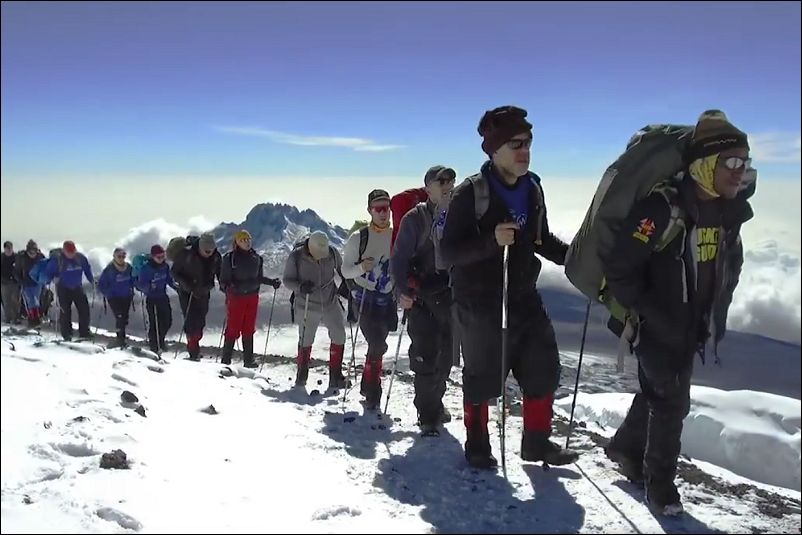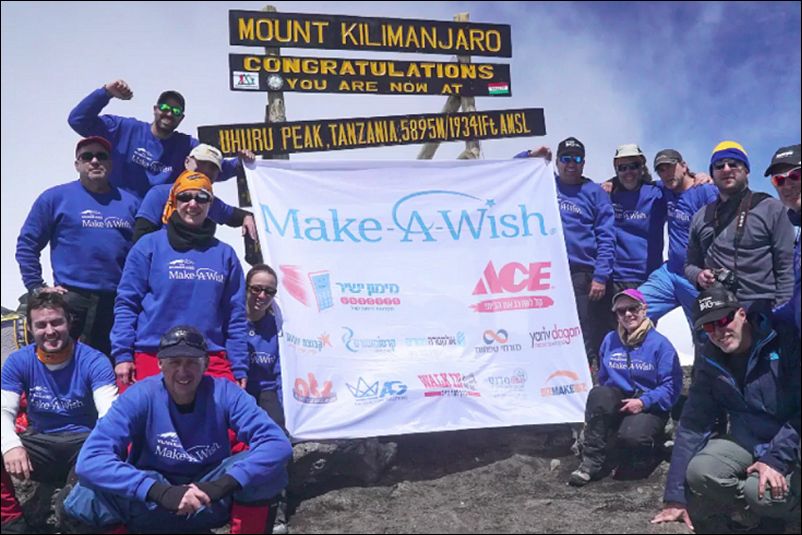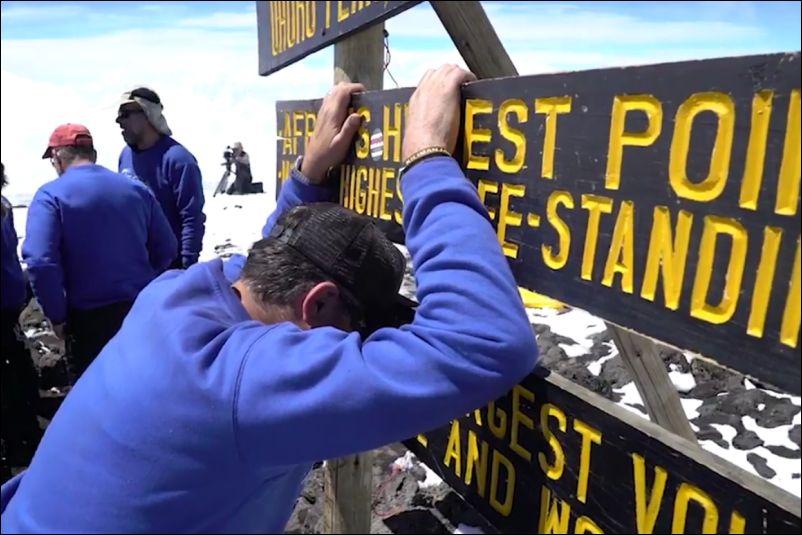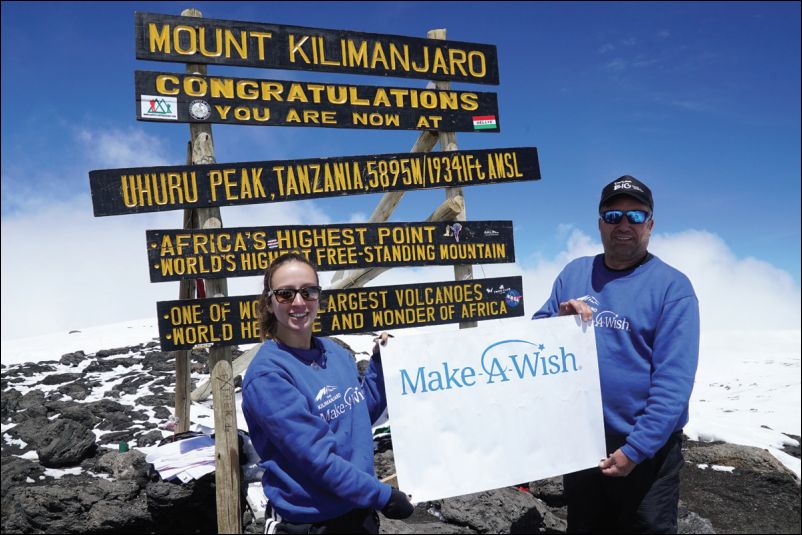The Make-A-Wish Israel team climbs Kilimanjaro for children with life-threatening illnesses
By Avi Bar Aharon
At the end of January this year, together with 13 members of our Make-a-Wish Israel delegation, I reached the summit of Mount Kilimanjaro in Tanzania. We were there on a once-in-a lifetime journey to accompany Noga Barkan, a 20-year-old cancer survivor, and we realized her wish – and our collective dreams together – at the climax of the climb.
When we reached the summit, it was an emotional moment for me, as well as physically exhausting. I immediately stretched out both my arms and placed them on the brown wooden plank that read, “Mount Kilimanjaro; Congratulations, you are now at Uhuru Peak, Tanzania, 5,895 meters, Africa’s highest point and the world’s highest free-standing mountain.” I almost felt like I was at the Western Wall in Jerusalem. I cried. We all cried – all 14 of us – because our mission was accomplished.
We were all witnesses to Noga conquering her illness by conquering this mountain. The symbolism was in all of our minds and hearts. I immediately called my wife, Denise, with whom I cofounded Make-a-Wish Israel.
She was so happy for me and the whole delegation, but especially for Noga. She said something that I love: “We may not give days to these children’s lives, but we certainly give life to their days, and today it is so wonderful that it has been scientifically proven that wishes are changing the lives of children with life-threatening critical illnesses. It’s really a testament to what we do, Avi. We are so privileged to grant wishes every day!”
But let me take you back to how it all started.
Make-a-Wish was established in 1980 in Phoenix, Arizona, when Linda, whose seven-year-old son Chris was suffering from cancer, granted him – together with the Phoenix Police Department – his wish to become a police officer for a day. Since then, more than 415,000 wishes have been granted in 50 countries worldwide, including 60 chapters in the United States alone.
Denise and I founded Make-a-Wish Israel in 1996, in memory of my brother-in-law, David Spero. Together with our board of directors, staff and volunteers, we have granted over 3,500 life-changing and truly transformational wishes for Israeli children with life-threatening llnesses.
In 2005, I climbed Mount Kilimanjaro for the first time with a delegation from Make-a-Wish
International. Our delegation included Yoni Dotan, a wish child from Israel and the son of the late famous Israeli comedian Dudu Dotan. Yoni, a cancer survivor, had his wish granted in 1997 when he met US president Bill Clinton at the White House.
His participation reminded us all why we were climbing. I will always remember the look on Yoni’s face when he reached the summit, and how proud he was to raise public awareness about our foundation and its work.
Yoni served on our board of directors for many years and is a true example of how, when we are able to fulfill someone’s one true wish, our “wish children” then feel that everything is possible and are able to draw on this feeling to fight their illness.
Since then, it was my dream to create the climb up Kilimanjaro for Make-a-Wish Israel with some of our board members and major supporters, and most importantly, one of our children who had succeeded in beating her disease, Noga. Three years ago, Noga was diagnosed one spring day with cancer, and her life changed 360 degrees. She was thrown into a world of hospital rooms, painful shots, treatments, and the loss of friends every month from the oncology department in which she spent more than a year. Noga, who is a star athlete, was forced to stop her athletic career and put her life on hold. The boys in her grade were so supportive that they all shaved their heads when Noga’s hair fell out due to the chemotherapy treatment she received. Today Noga is living proof that wishes do come true, and that there is life after cancer.
When I first met Noga, she was 17, and I was inspired to ask her one day to be the representative for all the children at Make-a-Wish fighting critical illnesses by climbing Mt. Kilimanjaro. Noga is an artistic gymnast, who was preparing to participate in the 2016 Rio Olympics when she was diagnosed with cancer. Following intensive medical treatments, Noga’s wish was granted and she flew to Rio to watch and cheer the Israeli artistic gymnastic delegation.
Today Noga is in full remission. On January 19, Noga and I led a delegation of 14 men and women on a ten-day mission (from January 19-29, 2018) to climb Kilimanjaro.
Noga said she was motivated to join the journey in hope of raising funds and awareness that will help grant more life-changing wishes to children in Israel fighting life-threatening medical conditions. Before the delegation left, my wife Denise, who is also the CEO of Make-a-Wish Israel, and Igave Noga an envelope with a letter and two “wish coins” to place on the summit of the mountain.
Make-a-Wish volunteers traditionally give the wish coin to wish children when they have “captured the wish.” The coin is a promise that their wish will be granted.
We left Ben-Gurion Airport late on January 19 and landed in Addis Ababa the next day; we began to feel that we were on our way. When we arrived in Tanzania, we were greeted warmly by the Tusker Trail company, which accompanied us with 70 incredible porters and guides, who did everything from carrying our tents and bags, to setting up the tents and cooking
dinner for us, and, of course, what they are best known for – checking our well-being with medical equipment every morning and night. As the leader of the delegation, I was counting the days and waiting for the day that all the planning and technical organization would be over, and I could be just one of the group climbing for wishes. On the morning of our flight, I was both excited and nervous, and I could not believe that we had arrived.
We were at the base camp for two days, one of which was a Friday night, where we lit Shabbat candles, blessed the bread, prayed over wine and sang songs with great excitement and anticipation.
What was so remarkable for me was having such special individuals with me on the journey. Each of them has a very busy daily schedule professionally and personally, and they were willing to just disconnect, knowing that they would not have access to their computers or smartphones for most of the seven-day climb. This, in itself, was a beautiful gesture.
I also found that this experience was very different from my first climb 13 years ago with Tusker Trail’s Eddie Frank leading the climb. We had no cell phones and sophisticated communications equipment. Then I had no need to speak to my family or the office because the technology simply didn’t exist.
The night before the climb, knowing that in just a few hours we would begin our ascent in the middle of the night, in the pitch dark with snow falling on us, all I could think of was wanting to share this special moment with my wife and children.
For her part, Noga said that although it had been a challenge and she found the climb really difficult, she was delighted to finally reach the top and place two coins on the ground – one for the children who are still battling illnesses, as she was just a few years ago, and another in memory of those who had passed away. It was an intensely emotional moment for us all. We raised a total of half a million shekels ($143,000 ) towards realizing the wishes of children fighting life-threatening illnesses.
Photos by Yariv Dagan






